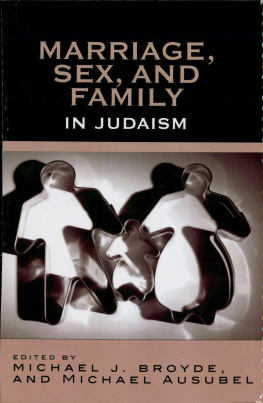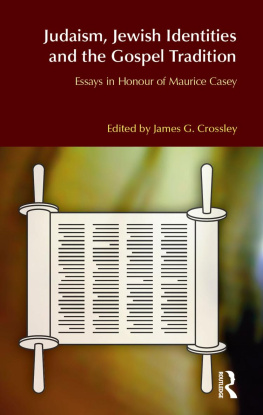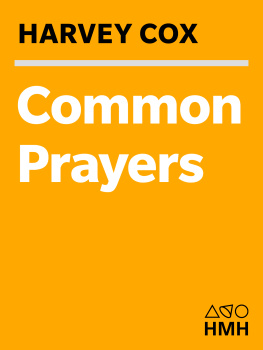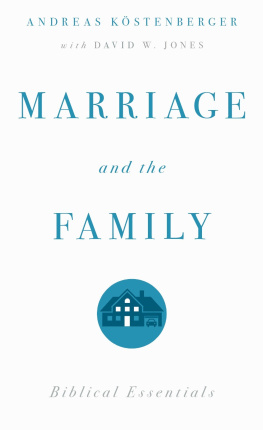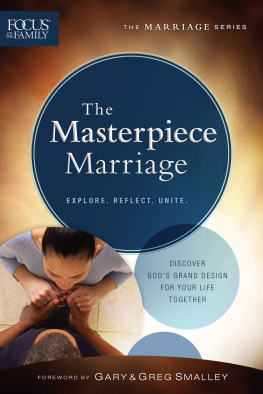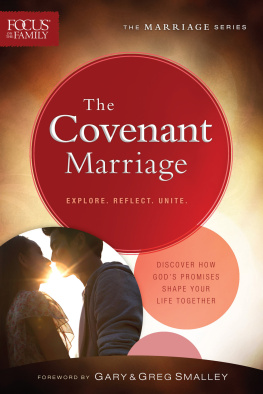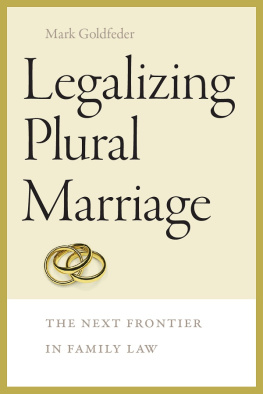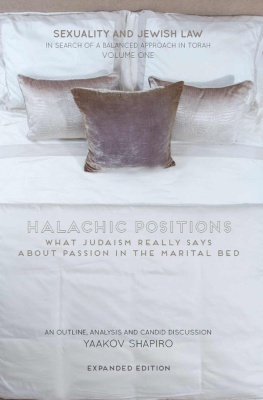Michael J. Broyde - Marriage, Sex and Family in Judaism
Here you can read online Michael J. Broyde - Marriage, Sex and Family in Judaism full text of the book (entire story) in english for free. Download pdf and epub, get meaning, cover and reviews about this ebook. year: 2005, publisher: Rowman & Littlefield Publishers, genre: Home and family. Description of the work, (preface) as well as reviews are available. Best literature library LitArk.com created for fans of good reading and offers a wide selection of genres:
Romance novel
Science fiction
Adventure
Detective
Science
History
Home and family
Prose
Art
Politics
Computer
Non-fiction
Religion
Business
Children
Humor
Choose a favorite category and find really read worthwhile books. Enjoy immersion in the world of imagination, feel the emotions of the characters or learn something new for yourself, make an fascinating discovery.
- Book:Marriage, Sex and Family in Judaism
- Author:
- Publisher:Rowman & Littlefield Publishers
- Genre:
- Year:2005
- Rating:5 / 5
- Favourites:Add to favourites
- Your mark:
- 100
- 1
- 2
- 3
- 4
- 5
Marriage, Sex and Family in Judaism: summary, description and annotation
We offer to read an annotation, description, summary or preface (depends on what the author of the book "Marriage, Sex and Family in Judaism" wrote himself). If you haven't found the necessary information about the book — write in the comments, we will try to find it.
Marriage, Sex and Family in Judaism — read online for free the complete book (whole text) full work
Below is the text of the book, divided by pages. System saving the place of the last page read, allows you to conveniently read the book "Marriage, Sex and Family in Judaism" online for free, without having to search again every time where you left off. Put a bookmark, and you can go to the page where you finished reading at any time.
Font size:
Interval:
Bookmark:
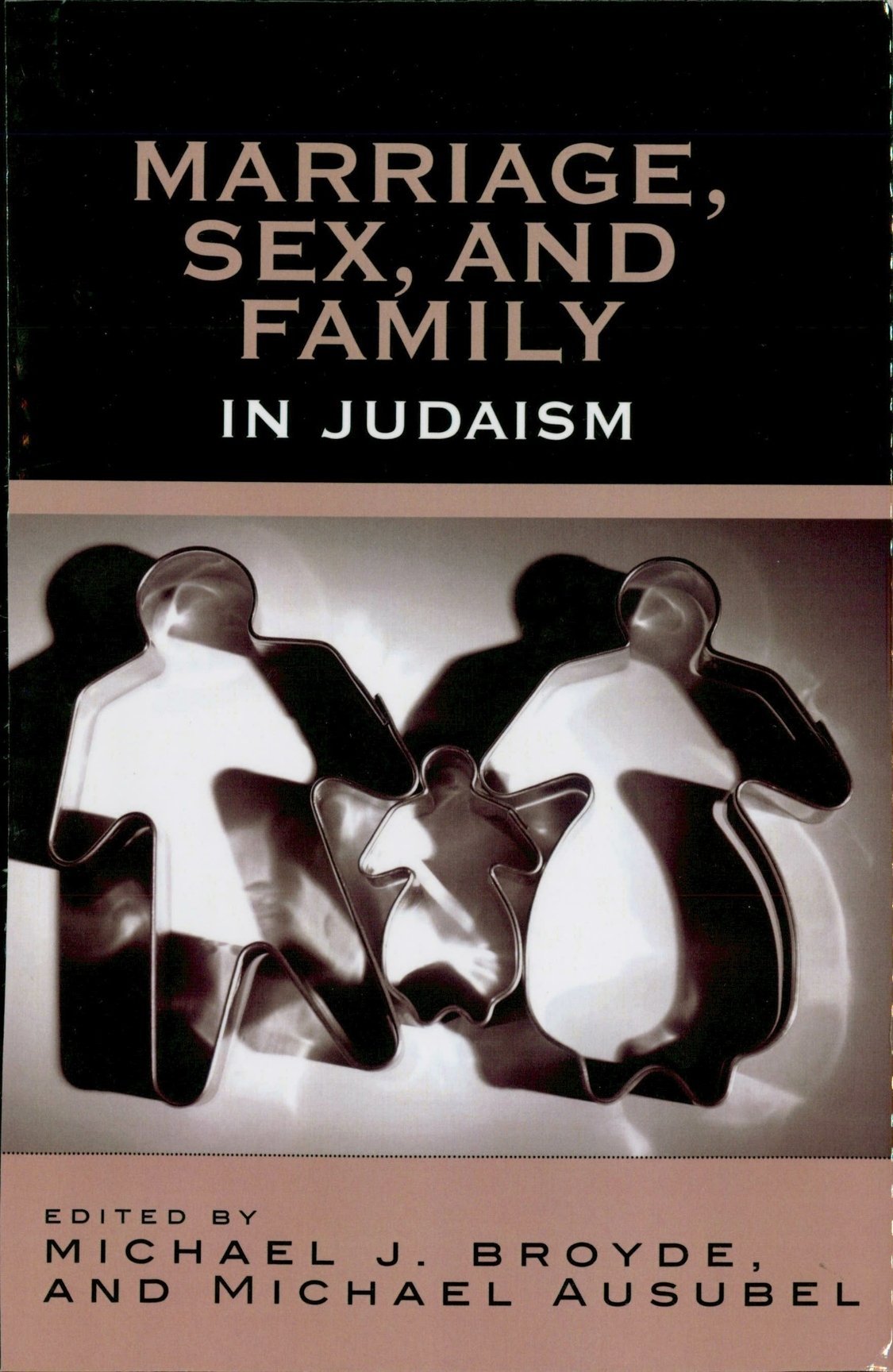
Michael Ausubel is a research and editorial assistant at the Emory University School of Law. He received his BA from Yeshiva University in 1999.
Michael S. Berger is associate professor of Jewish ethics in Emory Universitys Department of Religion. He is the author of Rabbinic Authority (1998) and has written articles on medieval and modern Jewish thought and medieval Jewish marriage.
David R. Blumenthal is the Jay and Leslie Cohen Professor of Judaic Studies at Emory University. He teaches and writes on constructive Jewish theology, medieval Judaism, Jewish mysticism, and Holocaust studies.
Michael J. Broyde is professor of law and academic director of the Law and Religion Program at the Emory University School of Law.
Elliot N. Dorff is rector, the Sol and Anne Dorff Distinguished Service Professor in Philosophy, and co-chair of the Bioethics Department of the University of Judaism. Rabbi Dorff is also vice-chair of the Rabbinical Assemblys Committee on Jewish Law and Standards.
David Novak is the J. Richard and Dorothy Shiff Professor of Jewish Studies at the University of Toronto and vice-president of the Union for Traditional Judaism.
Jonathan Reiss is director of the Beth Din of America, affiliated with the Rabbinical Council of America. Rabbi Reiss holds rabbinical and judicial ordination from the Rabbi Isaac Elchanan Theological Seminary and is a graduate of Yale Law School.
Angela J. Riccetti is a staff attorney with the Atlanta Legal Aid Society, specializing in family law. She received her JD/MA in law and religion from Emory University.
Jack Wertheimer is provost and the Joseph and Martha Mendelson Professor of American Jewish History at the Jewish Theological Seminary. He has written and edited books on contemporary Jewish religious life, Jewish religious leadership, and the history and contemporary condition of the Conservative movement.
Michael S. Berger
J UDAISM, LIKE OTHER millennia-old world religions, has within it many voices and opinions on such core human subjects as sexuality, marriage, and family. Unlike other world religions, however, Judaism has been, for most of its history, the tradition of a minoritya powerless, stateless, and often persecuted minority. An early period of independence, roughly coeval with the Bible, produced the literature (or its antecedents) that would become the foundational text of Judaism. But beginning with the destruction of Solomons Temple in 586 B.C.E. and the consequent exile of Judeans to Babylonia and Egypt, minority status became the norm for Jews, with few exceptions, until the modern period.
This reality had a profound impact on every facet of Judaism. Survival was the constant call, and the tradition mustered all of its resourcestheological, legal, social, and economicto meet the challenge. The family was, in many cases, the primary vehicle for preserving distinctiveness from the majority culture, and so the tradition used law, custom, and lore to govern its formation and maintenance. Indeed, from the Bible forward the Jewish people is portrayed at its core as a large extended family descended from the patriarch Jacob; and from the Second Temple period forward, Jews increasingly insisted on endogamy to ensure a common heritage.
Practically speaking, however, boundaries were far more permeable than was claimed; the forces preserving distinctiveness were always offset by those promoting accommodation. Jews were in regular contact with their neighbors, producing a startling array of Jewish thought and practice in all areas, including marriage and family. Indeed, some of the most significant alterations in the form and content of Jewish marriage, such as the emphasis on documents or the switch to monogamy, can be understood in this light. Therefore, the history of Jewish views on sex, marriage, and family can be most helpfully understood as the oscillation between the two poles of continuity with the Jewish covenant on the one hand and correlation with ones surroundings on the other.
While the majority of the Hebrew Bible, known as Tanakh, recounts the period of Israelite settlement in the land of Canaan, most scholars insist that the majority of canonical texts reached their current form in the Persian period (sixth to fourth century B.C.E.), when Jews lived as a minority population both in the province of Yehud in the Land of Israel, and elsewhere in Mesopotamia and Egypt. From this minority perspective, this collection of texts came to be the main scripture of the Jewish people because virtually all its books are about the Jewish peopleor, more specifically, its covenant with God.
Given the portrayal of the Jewish people as an extended family, one might think such a parochial story would begin with, or would quickly reach, the story of the nations progenitor, Abraham. However, the first eleven chapters of Genesis speak of Gods relationship with the world, beginning with the creation of a highly ordered and differentiated world. Each creature is part of a species, a group that is meant to know its place in the world and maintain its boundaries and functions. Man and woman are both informed and blessed to procreate, to be fruitful and multiply and assert stewardship over the created order. This state, termed as very good in divine eyes (Gen. 1:31), is presented somewhat differently in chapter 2, which offers the creation of woman as a response to the first mans loneliness: Therefore a man leaves his father and mother, clings to his wife, and becomes one flesh (Gen. 2:24). Thus, between the first two chapters, there emerges a sense that the union of man and woman was inherently good, intended since creation for the purposes of procreation and companionship (whether practical or emotional). But this idyllic state collapses as the first couple eats from forbidden fruit, with the consequence that they sense, for the first time, sexual shame (Gen. 3:7). Painful childbirth, female sexual passion, and male domination of the female are all presented as punishment for the womans submission to temptation and her insistence that her husband join her in the sin.
Humanitys decline continues until God chooses Abraham, promising him that his descendants will become abundant, great, and will receive the land of Canaan as an inheritance (Gen. 12:13). This divine blessing, later symbolized through circumcision (Gen. 17), comes to be the reward of a covenant whereby Abrahams descendants must obey Gods law as it was revealed to Moses at Sinai and during the wilderness wanderings. The peoples status as Gods special treasure among all the nations... a kingdom of priests, a holy nation (Exod. 19:56) is predicated on their living according to demanding standards, including a host of sexual norms (Lev. 18). These are deemed the idolatrous and abominable practices of the local tribes, and the Jews must maintain their purity and holinessor suffer a similar fate of displacement and exile.
The Tanakhs presentation of the history of the Jewish people as that of an extended familytwelve tribes, the descendants of the sons of Jacob, settling on ancestrally allotted landhighlights the texts assumption that the covenant is meant to be lived out in the context of large, agrarian patriarchal families, with a specific division of labor among men, women, and children and traditions passed from parents to children. The consequences of this orientation for our subjects cannot be overstated, yet virtually all have a covenantal overlay as well. Strict rules of endogamy and exogamy, including the prohibitions against incest mentioned above, controlled marriage with the aim of producing legitimate heirs; yet the text often adds the importance of these rules in maintaining allegiance to God: alien, non-Israelite women will lead men astray (Deut. 7:15, 23:29), unless, like Ruth, they accept the God of Israel. Polygamy is allowed (concubinage seemed to be the preserve of the aristocracy) so long as primogeniture is not disrupted; yet grave spiritual dangers accompany the pursuit of women other than ones wife, and monogamous marriage becomes the metaphor of the GodIsrael covenant (Deut. 21:1517, Ezek. 16:118, Prov. 5). The ideal woman, extolled in the famous poem in Proverbs 31, is both a competent manager of the household, overseeing food and cloth production, as well as a God fearer. To maintain order and preserve tradition in these agrarian hierarchies, respect of parents is demanded in the Decalogue (Exod. 20:12); incorrigibly disobedient children are to be publicly executed (Deut. 21:1821). At the same time, parents must educate children and pass on the tale of the nations birth and Sinaitic covenant with God, so that they may fear the Lord as well (Deut. 4:910, 6:47).
Font size:
Interval:
Bookmark:
Similar books «Marriage, Sex and Family in Judaism»
Look at similar books to Marriage, Sex and Family in Judaism. We have selected literature similar in name and meaning in the hope of providing readers with more options to find new, interesting, not yet read works.
Discussion, reviews of the book Marriage, Sex and Family in Judaism and just readers' own opinions. Leave your comments, write what you think about the work, its meaning or the main characters. Specify what exactly you liked and what you didn't like, and why you think so.

